牛津小学英语重点知识
英语牛津版六年级知识点
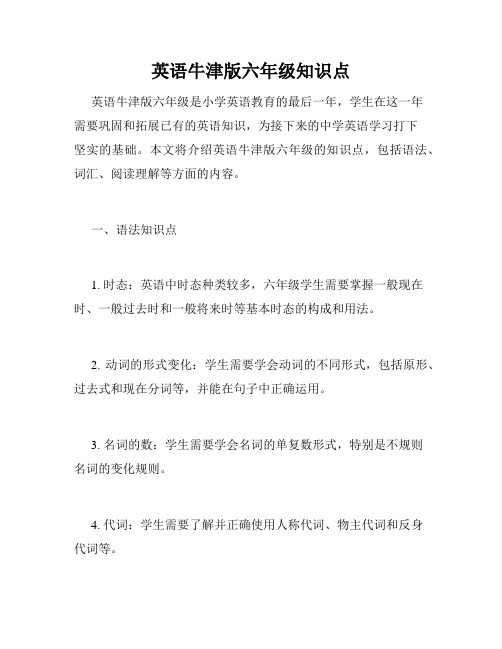
英语牛津版六年级知识点英语牛津版六年级是小学英语教育的最后一年,学生在这一年需要巩固和拓展已有的英语知识,为接下来的中学英语学习打下坚实的基础。
本文将介绍英语牛津版六年级的知识点,包括语法、词汇、阅读理解等方面的内容。
一、语法知识点1. 时态:英语中时态种类较多,六年级学生需要掌握一般现在时、一般过去时和一般将来时等基本时态的构成和用法。
2. 动词的形式变化:学生需要学会动词的不同形式,包括原形、过去式和现在分词等,并能在句子中正确运用。
3. 名词的数:学生需要学会名词的单复数形式,特别是不规则名词的变化规则。
4. 代词:学生需要了解并正确使用人称代词、物主代词和反身代词等。
5. 形容词和副词:学生需要学会形容词和副词的用法和比较级、最高级等的变化规则。
二、词汇知识点1. 常用词汇:六年级学生需要掌握一些基本的常用词汇,如家庭成员、动物、食物等,这些词汇在日常生活和学习中经常使用。
2. 句型词汇:学生需要扩展句子结构,学会使用连接词和短语来组成复杂的句子。
3. 扩展词汇:学生需要学习一些拓展词汇,如形容词的同义词和反义词,动词的近义词和一些常用短语搭配等。
三、阅读理解知识点1. 理解短文:学生需要学会阅读并理解一些简短的英文短文,获取信息并回答问题。
2. 猜测词义:学生需要通过上下文的提示来猜测生词的意思,提高阅读能力。
3. 根据短文内容回答问题:学生需要根据短文中的信息来回答问题,培养整体理解能力。
四、写作知识点1. 写作格式:学生需要学会写一篇简单的英语作文,包括开头、主体和结尾。
2. 写作内容:学生可以写一些简单的介绍自己、描述家人或朋友等日常生活的话题,培养写作能力。
3. 语言表达:学生需要运用所学的语法知识和词汇,正确地表达自己的思想和观点。
以上是英语牛津版六年级的一些知识点,通过学习这些知识点,学生可以更好地掌握英语,提升听、说、读、写的能力。
在完成六年级的学习后,学生将具备进一步学习中学英语的能力和信心。
小学英语牛津版AMM知识点汇总

M3U1 Around the city一Words 单词1. around 绕着2. city 城市3. hotel 旅店;旅馆4. bank 银行5. hospital 医院6. bakery 面包房7. museum 博物馆8. cinema 电影院9. along 沿着 10. left 左边反义词:right 右边二Phrases 词组1. Excuse me. 劳驾;请问2. get to City Cinema 到达城市影院3. get to the zoo 到达动物园4. take an/the underground 乘地铁5. at Brown Street Station 在布朗街车站6. get off at Sea Street Station 在海洋街车站下车7. on Park Road 在派克路8. walk/go along Green Road 沿着格林路走9. turn left 向左转 10. at the first crossing 在第一个十字路口11. next to the underground station 紧靠地铁站三Sentences 句子1. Excuse me. How do I get to City Cinema请问;我怎么到达城市电影院2. Take the underground at Brown Street Station and get offat Sea Street Station.在布朗街车站乘地铁;在海洋街车站下车..3. Walk/Go along Green Road and turn left; and then cross Park Street.沿着格林路向左转;然后穿过派克街..M3U1 At the zoo一Words 单词1. meet 见面同音词meat2. crocodile 鳄鱼3. lane 小路;巷;弄4. great 好极了5. zebra 斑马6. snake 蛇7. monkey 猴子8. lion 狮子 9. ocean 海洋 10. world 世界 11. sea 大海同音词see12. turn 转动 13. shark 鲨鱼 14. afraid 害怕反义词brave15. dolphin 海豚 16. pool 池塘 17. cute 娇小伶俐的近义词clever18. restaurant 饭店 19. ask 问反义词answer 20. dark 黑暗的反义词bright21. giraffe 长颈鹿 22. naughty 调皮的 23. laugh 大笑微笑smile二Phrases 词组1. different animals 不同的动物2. look at a map of the zoo 看一张动物园的地图3. on our right 在我们右边on our/the left4. after that从那以后5. walk along Winter Lane 沿着Winter 路走6. a visit to Ocean Word 参观海洋世界7. sea animals 海洋动物 8. at Ocean World 在海洋世界9. in a big pool 在大池塘里 10. twelve fifteen 十二点一刻a quarter past 1211. look for a restaurant 寻找饭店12. get to the restaurant 到达饭店13. make us laugh 让我们大笑三Sentences 句子1. Peter meets his friends at the zoo.Peter在动物园见他的朋友..2. They are looking at a map of the zoo.他们在看一张动物园的地图..3. The Wangs are going to Ocean World.姓王的一家人正准备去海洋世界..4. The dolphins are jumping and swimming in a big pool.海豚正在大水池里跳跃;游泳..5. Go along Green Road and turn right at the first crossing.沿着格林路走;在第一个路口向左转..M3U2 Buying new Clothes一Words 单词1. clothes 衣服2. button 纽扣3. zip 拉链4.pocket 口袋5. which 哪一个6. dress 连衣裙复数dresses7.shirt 男衬衫8. blouse 女衬衫 9. T-shirt T恤衫 10. skirt 短裙11. shorts 短裤12. pants 裤子同义词trousers 13. price 价格 14.try 试一试15. buy 买反义词sell 16. idea 主意 17.pretty 漂亮的二Phrases 词组1. put on her dress 穿上她的连衣裙2. at a clothesshop 在衣服店3 a pair of shoes 一双鞋 4. two pairs oftrousers 两条裤子5. the pink ones 粉色的那些6. try on 试穿7. a good idea 一个好主意 8. too small太小了9. which T-shirt 哪一件T恤衫三Sentences 句子1. Which coat do you like I like the green one.你喜欢哪一件外套我喜欢绿色的那件..2. How much is it It’s 85 yuan.它多少钱 85元..3. How much are the pants They are 70 yuan.裤子多少钱 70元..4. My dress is too small. Yes. You need a new dress;I think.我的连衣裙太小了.. 是的..我想你需要一件新的..5. Why not try on both Good idea.为什么不两件都试一下呢好主意..M3U2 Buying new Clothes一 Words 单词1. pretty 漂亮的反义词ugly 丑陋的2. emperor 皇帝3. magic 魔术4. nod 点头5. smile 微笑6. money 钱7. keep 保持8. silent 安静的 9. cry 哭三单cries10. nothing 没有东西 11. dot 圆点12. truth 实话形容词true真实的 13. sweater 毛衣14. raincoat 雨衣15. slippers 拖鞋 16. sneakers 旅游鞋;胶底鞋 17. boots 靴子二 Phrases 词组1. try on these dresses 试试这些连衣裙2. look great on you 太适合你了3. take the blue one 买蓝色的一条4. with some new clothes 带着一些新衣服5. with a big smile 笑容可掬6. a lot of money 许多钱7. put on new clothes 穿上新衣服wear new clothes 穿着新衣服8. keep silent 保持安静 9. cry out 大喊大声疾呼10. polka dot 带圆点花纹11. hundreds of polka dots 数百个圆点;成百上千个圆点三 Sentences 句子1. What do you think; Mum They look great on you.妈妈;你觉得怎么样它们看上去很适合你..2. Then let’s take the blue one.那我们就买蓝色的那条..3. One day; a man visits the emperor with some new clothes.一天;一个男人带着新衣服拜访了这个皇帝..4. The emperor cannot see any clothes; but he nods with a bigsmile and says; “ They are so beautiful”皇帝看不见衣服;但他笑容可掬地说:“衣服多么漂亮”M3U3 Seeing the Doctor一 Words 单词1. fever 发热2. toothache 牙痛3. cough 咳嗽4.rest 休息5. warm 温暖的反义词cool 凉爽的6. dentist 牙医7. medicine 药8. soft 软的反义词hard 硬的 9. before 在…之前反义词after在…之后10. should 应该shouldn’t= should not 不应该 11. soon 不久之后 12. will 将13. good 好的近义词:well 身体好的比较级: better 最高级: best二 Phrases 词组1. see the doctor 看医生2. have a cold 得了感冒3. wear warm clothes 穿暖和的衣服4. have a good rest 好好休息一下5. drink a lot of water 喝很多水6. drink too much soft drinks 喝太多软饮料7. take some medicine 吃一些药 8. feel well 感觉良好9. have a look 看一看三 Sentences 句子1. I have a toothache. What should I doYou should go to see the dentist. You shouldn’t eat too many sweets.我牙痛;我应该干什么你应该去看牙医..你不应该吃太多的糖..2. I have a cold. What else should I doYou should go to see the doctor. You should drink a lot ofwater and have a good rest.我得了感冒;我应该干什么你应该去看医生..你应该喝很多水;好好洗休息一下..3. What’s wrong with you How do you feel I have a cough.你怎么啦你感觉怎么样我咳嗽了..4. Kitty is not feeling well.Kitty 今天感觉不好..5. You will be better soon.你很快就会好的..M3U3 Seeing the Doctor一 Words 单词1. either 也用于否定句和疑问句;同义词 too用于肯定句2. toothless 无牙的3. king 国王4. hide 躲藏5. themselves 他们自己6. cave 洞穴7. secret 秘密8. present 礼物近义词gift 9. meeting 会议10. really 真的 11. hurt 受伤;伤害12. worry 担心 13. become 变成;成为二 Phrases 词组1. come and have lunch 来吃午饭2. at the dentist’s 在牙科诊所3. brush your teeth 刷牙4. in the evening在傍晚at night在深夜5. look at your teeth 看你的牙齿6. how many times多少次7. I see. 我明白了.. 8. the king of theforest 森林之王9. be afraid of 害怕 10. have a meeting开会11. hide themselves 把他们自己藏起来12. in a secret cave 在秘密的山洞里 13. have an idea有了主意14. a large packet of sweets 一大袋糖果 15. pull out 拔掉16. What’s wrong=Wha t’s the matter 怎么啦三 Sentences 句子1. Peter and his mum are at the dentist’s.Peter和妈妈在牙医诊所里..2. You shouldn’t drink too much soft drinks.你不应该喝太多软饮料..3. How many times a day do you brush your teeth Once;in the morning.你一天刷牙几次一次;在早上..4. The fox gives the tiger a large packet of sweets.狐狸给老虎一大袋糖果..5. They pull out all the tiger’s teeth. He becomes a toothless tiger.他们拔掉了老虎所有的牙齿..他变成了一只无牙的老虎..M4U1 The Natural World一 Words 单词1. first /f :st/ 首先;第一的2. next 下一个3. then 然后4. finally fa n li最后形容词final5. boil b l煮;烧开6. cup 茶杯、7. pour p :r倒;灌8. tea pot 茶壶 9. taste te st尝二 Phrases 词组1. make some tea 泡茶2. boil the water 烧水3. put some tea into the cup 放一些茶叶在茶杯里4. pour hot water into the cup 把热水倒在茶杯里5. drink some tea 喝茶6. in the kitchen 在厨房里7. taste great 味道好极了三 Sentences 句子1. Let’s make some tea. What do we doFirst we boil the water. Next we put some tea into the cup.Then; we pour hot water into the cup. Finally we drink the tea.让我们泡茶.. 我们做什么呢先烧水;接着放一些茶叶在茶杯里..再把热水倒入茶杯里..最后喝茶..2. Kitty is in the kitchen with her grandma.Kitty 和她的奶奶在厨房里..3. Would you like some tea Yes; please.你想要一些茶吗好的;请吧..M4U1 The Natural WorldWords 单词1. report r p :t报告2. start stɑ:t开始3. high 高的反义词:low 低的4. west west西面对应词east 东面5. through θru:通过6. gorge g :d 山峡;峡谷7. lake 湖区分river 河流8. part 部分9. journey d :ni旅程;行程 10. drop 掉下;滴下11. raindrop 雨滴 12. fall 落下13. rise ra z升起来 14. inside 在里面反义词outside15. sunlight 日光 16. hold 握着;抓住17. above 在…上方 18. rainbow 彩虹二 Phrases 词组1. give a report 作报告2. about the Yangtze River 有关长江3. in the west of China 在中国西部4. run down the mountains 流下山5. through the beautiful Three Gorges 经过风景秀丽的三峡6. part of the Yangtze River 长江的部分7. Little WaterDrop 小雨滴8. a piece of white paper 一张白纸 9. above the paper 在纸的上方三 Sentences 句子1. First the Yangtze River starts high in the mountains in thewest of China.首先;扬子江发源于中国西部的高山上..Next it runs down the mountains and through the beautifulThree Gorges.接着;它沿着山脉往下流;经过风景秀丽的三峡..Then it meets more water from many other lakes and rivers.然后;它与很多来自其他河流湖泊的水汇合..2. The sun shines and Little Water Drop gets hot. He rises upto the sky.太阳照耀着;小水滴变热了..他升上了天空..Little Water Drop flies over rivers and mountains.小水滴飞过了河流和山脉..Little Water Drop falls down to the ground.小水滴降落在了地上..3. Next; take them near the window; into the sunlight.接着;把它们拿到窗户边;太阳光下面..M4U2 Wind(一)Words 单词1. gently 轻轻地形容词:gentle 轻轻的 d entli2. strongly 强有力地;猛烈地形容词:strong 猛烈的;强壮的str l3. slowly 慢慢地形容词:slow 缓慢的4. quick 快速的形容词:quickly 快速地kw k5. happy 高兴的副词:happily 高兴地6. soft 柔软的副词:softly 柔软地7. wind 风 8. windmill 风车 w ndm l9. move 移动 10. blow 吹二 Phrases 词组1. no wind 没有风2. in the sea 在海里3. fly kites 放风筝4. in the wind 在风里三 Sentences 句子1. The wind blows strongly. The windmill moves quickly.风猛烈地吹着.. 风车转动得很快..2. The flowers dance in the wind softly.花在风中温柔地跳着舞..3. The children fly their kites happily.孩子们在高兴地放风筝..4. The wind blows. Sometimes it blows gently. Sometimes it blows strongly.风吹着.. 有时候它温柔地吹着.. 有时候它猛烈地吹着..M4U2 Wind一 Words 单词1. heavy 沉重有力的;剧烈的副词:heavily 猛烈地;厉害地2. tomorrow 明天3. wind-bell 风铃4.make 制作5. wood 木头6. circle 圆形7.line 线;绳8. fold 折叠 9. pin 针;别针;绑;别起来 10. sick小木棒二 Phrases 词组1. a rainy day 一个下雨天2. look out of thewindow 看窗外3. go out and play 出去玩4. some heavy rain 倾盆大雨5. a strong wind 一阵猛烈的风6. watch the weather onTV 在电视上看天气7. be made of wood 用木头制作 8. make a wind-bell制作风铃9. the sound of wind 风的声音 10. cut it out cut outthe circle 把圆剪下来11. cut along them the circles 沿着圆把它们剪下来12. fold as a windmill 折叠成风车13. pin it to a pencil or stick 别上一支铅笔或一根小棍三 Sentences 句子1. Mum ;can we go out now I’m afraid you can’t.妈妈;我们现在能出去吗恐怕你们不能..2. But tomorrow will be a fine day.但明天将会是个好天气..3. Little Duck has a glass wind-bell on her window.小鸭子有个玻璃的风铃在她的窗户上..4. Little Pig wants to hear the sound of the wind.小猪想要听风的声音..5. Draw eight lines and cut along them.画八条线;并且沿着线剪下来..6. Pin it to a pencil or a stick.别上一支铅笔或一根小棍..M4U3 Fire一Words 单词1. fire 火2. start 开始反义词:finish 结束3. campfire 营火;篝火4. match 火柴复数:matches5. safety 安全形容词:safe安全的6. must 必须否定:mustn’t 禁止7. forest 森林8.poster 海报9. careful 小心的副词:carefully 小心地;仔细地二Phrases 词组1. start campfire 开始营火2. play with matches 玩火柴3. play near fires 在火边玩耍4. talk about the firesafety 讨论消防安全知识三Sentences 句子1. For fire safety ; what mustn’t we do We mustn’t play with matches.为了消防安全;我们必须不能做什么我们绝不能玩火柴..2. Don’t start campfire = You can’t start campfire. = No starting campfire.不要启动营火3. Children mustn’t play near fires.孩子们绝不能在火边玩儿..4. People must be careful.人们一定要小心..5. Fires can start in forests; in schools and at home.火灾可能在森林里;在学校和在家里发生..M4U3 Fire一 Words 单词1. burn 燃烧;着火2. lucky 幸运的副词:luckily 幸运地3. hurt 受伤4. thick 浓的;厚的;粗的反义词:thin 稀的;薄的5. everywhere 到处6. helicopter 直升飞机7. drop 掉下现在分词:dropping8. fight 与…战斗;打架名词:fighter 战士9. brave 勇敢的副词:bravely10. use 使用现在分词:using 11. die 死亡形容词:dead12. age 年龄 13. cave 洞 14. heat 热量形容词:hot15. light 光;光亮 16. raw 生的 17. hate 恨反义词:love 爱18. lift 电梯 19. dangerous 危险的反义词:safe 安全的20. if 假如;如果 21. smoke 烟形容词:smoky 有烟雾的22. cover 覆盖 23. crawl 爬行;匍匐前进二 Phrases 词组1. in a country park 在乡村公园2. thick smoke 浓烟3. drop water on the fire 在火上浇水4. use a lotof water 用很多水5. die down 熄灭put out 扑灭6. put a sign 放一个标志7. in the Stone Age 在石器时代 8. give us heatand light 给我们光和热9. eat raw meat 吃生肉 10. not at all 一点也不11. throw it away into the fire 把塔扔进火里 12. go outside出去come inside 进来13. crawl out 爬出去三Sentences 句子1. The fire starts because people start a campfire.火灾发生是因为人们启动了营火..2. Helicopters are dropping water on the fire.直升飞机在火上浇水..3. Soon; the fire dies down.不久;火熄灭了..4. Fire gives us heat and light.火给我们光和热..5. It does not taste good at all.味道尝起来一点都不好..6. When you see a fire; quickly go outside.当你看见火的时候;赶快出去..。
(完整版)上海牛津小学英语语法知识总结

上海牛津小学英语语法知识总结一般现在时1、定义:表示经常发生或习惯性的动作、状态。
句中通常有usually,often,every day,sometimes,always,at weekends,on Sundays等表示经常性时间的短语。
2、构成:1)当谓语是be动词时,一般现在时的构成:主语+be动词+其他如:I am a student. He is Jim’s father.They are from Japan.2)当谓语是行为动词时,一般现在时的构成:①主语(非第三人称单数)+动词原形+其他如:I often watch TV at the weekends.Mr Green and Mrs Green like collecting stamps.②主语(第三人称单数)+动词的第三人称单数形式+其他如:Jim usually visits his grandparents on Sundays.She sometimes goes to the park with her mother.3、动词三单形式的变化规则:•一般情况下,直接加s 如:read-reads,swim-swims•以s,x,sh,ch,o结尾,加es 如:wash-washes,watch-watches,do-does•以辅音字母+y结尾,变y为i,再加es 如:study-studies,fly-flies•不规则变化如:have-has4、一般现在时的句型转换:肯定句否定句一般疑问句及回答They watch TV every day. They don’t watch TVevery day.—Do they watch TV every day?—Yes, they do. / No, they don’t.She watches TV every day. She doesn’t watchTV every day.—Does she watch TV every day?—Yes, she does. / No, she doesn’t.现在进行时1、定义:表示现在或现阶段正在进行或发生的动作。
牛津版英语小学知识点归纳总结
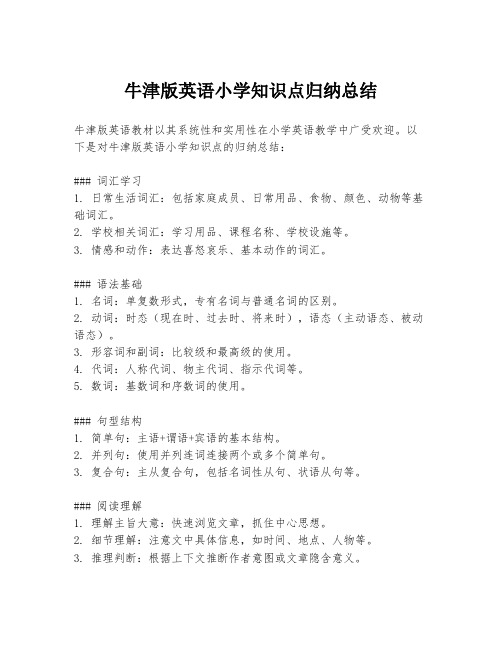
牛津版英语小学知识点归纳总结牛津版英语教材以其系统性和实用性在小学英语教学中广受欢迎。
以下是对牛津版英语小学知识点的归纳总结:### 词汇学习1. 日常生活词汇:包括家庭成员、日常用品、食物、颜色、动物等基础词汇。
2. 学校相关词汇:学习用品、课程名称、学校设施等。
3. 情感和动作:表达喜怒哀乐、基本动作的词汇。
### 语法基础1. 名词:单复数形式,专有名词与普通名词的区别。
2. 动词:时态(现在时、过去时、将来时),语态(主动语态、被动语态)。
3. 形容词和副词:比较级和最高级的使用。
4. 代词:人称代词、物主代词、指示代词等。
5. 数词:基数词和序数词的使用。
### 句型结构1. 简单句:主语+谓语+宾语的基本结构。
2. 并列句:使用并列连词连接两个或多个简单句。
3. 复合句:主从复合句,包括名词性从句、状语从句等。
### 阅读理解1. 理解主旨大意:快速浏览文章,抓住中心思想。
2. 细节理解:注意文中具体信息,如时间、地点、人物等。
3. 推理判断:根据上下文推断作者意图或文章隐含意义。
### 写作技巧1. 叙述文:描述事件或经历,使用第一人称或第三人称。
2. 说明文:介绍事物或解释概念,使用客观语言。
3. 议论文:表达观点,提出理由,使用逻辑连接词。
### 听力理解1. 捕捉关键信息:注意对话或短文中的关键词汇和短语。
2. 理解语境:根据上下文判断说话人的意图和情感。
3. 预测和推断:根据听到的信息预测接下来可能发生的事情或推断说话人的态度。
### 口语表达1. 自我介绍:使用简单句型介绍自己和家庭。
2. 日常对话:学习基本的问候语、询问和回答。
3. 描述和叙述:描述事物特征或叙述事件经过。
### 学习策略1. 记忆技巧:使用联想记忆、图像记忆等方法记忆词汇。
2. 笔记技巧:在课堂上做笔记,记录关键信息。
3. 复习策略:定期复习所学内容,巩固记忆。
### 文化意识1. 节日习俗:了解不同文化背景下的节日和习俗。
上海小学牛津英语语法归纳总结
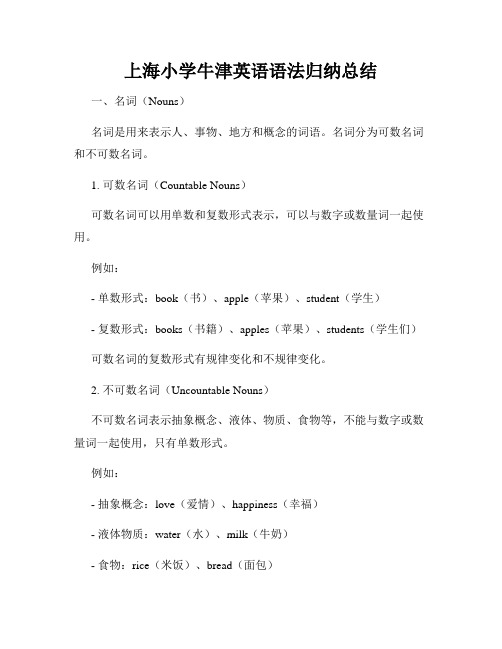
上海小学牛津英语语法归纳总结一、名词(Nouns)名词是用来表示人、事物、地方和概念的词语。
名词分为可数名词和不可数名词。
1. 可数名词(Countable Nouns)可数名词可以用单数和复数形式表示,可以与数字或数量词一起使用。
例如:- 单数形式:book(书)、apple(苹果)、student(学生)- 复数形式:books(书籍)、apples(苹果)、students(学生们)可数名词的复数形式有规律变化和不规律变化。
2. 不可数名词(Uncountable Nouns)不可数名词表示抽象概念、液体、物质、食物等,不能与数字或数量词一起使用,只有单数形式。
例如:- 抽象概念:love(爱情)、happiness(幸福)- 液体物质:water(水)、milk(牛奶)- 食物:rice(米饭)、bread(面包)不可数名词没有复数形式,不能直接与冠词a/an连用。
二、冠词(Articles)冠词用于限定名词的范围,分为定冠词和不定冠词。
1. 定冠词(Definite Article)定冠词是"the",用于特指已经提到的人或物,或者特指上下文中的某人或某物。
例如:- I saw a cat in the tree.(我看到树上有一只猫)- The cat was black.(那只猫是黑色的)2. 不定冠词(Indefinite Article)不定冠词有两种,分别是"a"和"an"。
用于泛指某一类人或物。
例如:- I have a dog.(我有一只狗)- She is an actress.(她是一名女演员)不定冠词"a"后面接辅音音素开头的词,"an"后面接元音音素开头的词。
三、形容词(Adjectives)形容词用来描述名词的特征和性质。
形容词通常位于名词之前。
- a big house(一个大房子)- a beautiful flower(一朵美丽的花)形容词可以用于比较级和最高级。
牛津英语六年级知识点总结
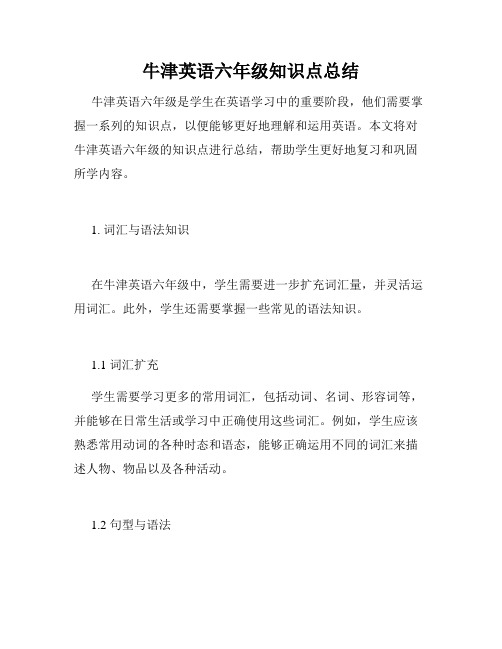
牛津英语六年级知识点总结牛津英语六年级是学生在英语学习中的重要阶段,他们需要掌握一系列的知识点,以便能够更好地理解和运用英语。
本文将对牛津英语六年级的知识点进行总结,帮助学生更好地复习和巩固所学内容。
1. 词汇与语法知识在牛津英语六年级中,学生需要进一步扩充词汇量,并灵活运用词汇。
此外,学生还需要掌握一些常见的语法知识。
1.1 词汇扩充学生需要学习更多的常用词汇,包括动词、名词、形容词等,并能够在日常生活或学习中正确使用这些词汇。
例如,学生应该熟悉常用动词的各种时态和语态,能够正确运用不同的词汇来描述人物、物品以及各种活动。
1.2 句型与语法在六年级,学生需要理解并运用一些复杂的句型和语法结构。
例如,学生应该能够正确使用比较级和最高级来进行描述,掌握被动语态的用法,理解并运用条件句和虚拟语气等。
2. 阅读理解阅读理解是英语学习中非常重要的一部分,通过阅读能够提高学生的语言理解能力和阅读能力。
在六年级,学生需要阅读各种不同题材的文章,并能够正确理解并回答相关问题。
2.1 理解词义学生需要通过上下文理解词义,掌握一些常见的词汇搭配和短语用法,从而能够准确理解文章中出现的生词和难词。
2.2 主旨大意学生需要能够通过阅读文章的段落和标题,理解文章的主旨大意,并能够回答与文章内容相关的问题。
3. 听力技巧在牛津英语六年级的学习中,学生需要提高自己的听力技巧,能够准确理解并回答听力材料中的问题。
3.1 听懂对话学生需要通过听力材料,能够听懂日常生活中的对话,包括人物的名字、地点、时间以及具体的活动内容。
3.2 提取关键信息学生需要通过听力材料,能够准确提取关键信息,包括人物的观点、意见、喜好等,从而能够回答与听力材料相关的问题。
4. 口语表达牛津英语六年级的学习也涉及到口语表达,学生需要能够流利地用英语进行口头交流,以及正确运用一些常用口语表达。
4.1 日常交流学生需要通过与他人的交流,能够用英语进行日常生活中的问候、介绍、询问信息等。
牛津小学英语毕业考试考前归纳

牛津小学英语毕业考试考前归纳1.不可数名词:bread,juice,tea,coffee,water,chocolate,rice,paper(不可数名词都默认为单数,所以总是用is或者was;不要根据some、any、a lot of等词去作判断,以免受误导。
) 2.不规则名词复数:man ---men, woman---women, policeman---policemen, policewoman---policewomen, mouse---mice child---children foot---feet,.tooth---teeth fish---fish, people---people,Chinese---Chinese, Japanese---Japanese3.动词/介词+宾格(me/us/you/him/her/them/it)4. 形容词性物主代词(my/our/your/his/her/their/its)后面必须要跟名词。
名词性物主代词(mine/ours/yours/his/hers/theirs/its)后面不要跟名词。
5. 比较级+than/……,A or B? as+原级 as too/very+原级6.形容词一般形容事物副词一般形容动词注意too, very 后接形容词,副词原级;much, a lot, a little 后接形容词,副词比较级两个事物之间只有比较级,三个或三个以上才有最高级7.序数词前一定要加“the”,序数词一般用于:①日期【the 号(序数词)of 月】②【第几…】③same 前,, look the same8.助动词(do/does/did)+动词原形to+动词原形情态动词(can/may/must/should/would/shall)+动词原形①in + 月、年the morning/afternoon/evening/a week9.表示时间②on + 具体某一天(几月几日)/某个假期(…Day)③at + 具体某点时间、某个假期(…Festival)/the weekend①in…street10.表示方位②on…road/left/right③at the…crossing/stop/某个具体的地点11. ①in the tree(不是树上长出来的) 12. play the +乐器13.want to +动词原形②on the tree(树上原来自己长出来的) play+球类运动would like to +动词原形14.表示时间:①ago(……以前) later(……以后) 15.be good at 名词原形② before (在……以前) after(在……以后) 动词+ing16.like+ 名词复数17. with长在身上的,拿在手里的18. What/How about going to the park?动词+ing in 穿在身上的Thank you for helping me.19.on the plate 在盘子里20.touch…with…用……触摸……21. feel + 感觉感觉… 22.in the classroo m 在教室里I’ve got + 病、物体我得了…,我有…in class在课堂上23.the same +名词单数24. 分≤30分分past小时半个小时=30分=halfdifferent+名词复数分﹥30分分to 小时+1 1刻=15分=a quarter25.open /close+直接可以打开得物体26. It’s time to +动词原形27. look for 寻找(强调过程)turn on/ turn off +开关、电器for+名词find 找到(强调结果)28.watch TV/cartoons/…race/…game/…match观看(电视/卡通/……比赛) 29. take off 脱下see 看到(人物/物体)put on 穿上look for 寻找/ look like 看起来像/ look after 照看,照顾/ look at 看30.There be句型表示:在某地有某物(或人)have、has、had表示:某人拥有某物。
牛津英语六年级知识点

牛津英语六年级知识点牛津英语六年级是学生在英语学习中的关键时期。
在这个阶段,学生需要掌握一系列的知识点,以便能够理解和运用英语进行交流。
本文将介绍牛津英语六年级的重要知识点。
一、词汇词汇是学习英语的基础,六年级学生应该掌握一定的词汇量,并能够正确地理解和使用这些单词。
以下是一些重要的词汇知识点:1. 基本词汇:六年级学生应该熟悉一些基本的英语单词,比如数字、颜色、动物、食物等。
2. 动词时态:六年级学生应该了解并能正确运用一些基本的动词时态,比如一般现在时、一般过去时和一般将来时。
3. 高频词汇:六年级学生应该熟悉一些常见的高频词汇,比如表示时间、空间、数量等的词汇。
二、语法语法是英语学习的重要组成部分,六年级学生需要掌握一些基本的语法知识,以便能够正确地组织句子和表达意思。
以下是一些重要的语法知识点:1. 句子结构:六年级学生应该了解一般句子的结构,包括主语、谓语和宾语等。
2. 时态和语态:六年级学生应该了解各种动词时态和语态的用法,比如一般现在时、一般过去时和一般将来时,以及被动语态等。
3. 疑问句和否定句:六年级学生应该能够正确地构建疑问句和否定句,并能理解其用法。
三、阅读理解阅读理解是培养学生阅读能力和理解能力的重要途径。
六年级学生需要通过阅读理解题目来提高自己的阅读理解水平。
以下是一些重要的阅读理解知识点:1. 提问和回答:六年级学生需要学会根据问题从文章中找到相关信息,并能够准确地回答问题。
2. 理解细节:六年级学生需要能够理解文章中的细节,并能够在文章中找到对应的信息。
3. 推理判断:六年级学生需要通过阅读理解题目,培养自己的推理和判断能力。
四、口语交流口语交流是英语学习的重要环节,六年级学生需要通过口语交流来提高自己的口语表达能力。
以下是一些重要的口语交流知识点:1. 日常表达:六年级学生应该学会使用一些日常用语,比如问候语、道谢和请求等。
2. 对话场景:六年级学生需要通过模拟对话来提高自己的口语表达能力,比如购物对话、问路对话等。
三年级部牛津英语知识点

三年级部牛津英语知识点
牛津英语是一套广泛使用的英语教材,旨在帮助学生从基础到高级逐
步掌握英语知识。
对于三年级的学生来说,牛津英语课程通常会涵盖
以下知识点:
1. 基础词汇:学习日常生活中常用的单词,如颜色、数字、家庭成员、动物、食物等。
2. 基本句型:掌握基本的英语句子结构,如主语+谓语+宾语(SVO)
结构,以及一些简单的疑问句和陈述句。
3. 日常对话:学习简单的日常交流用语,包括问候语、自我介绍、询
问和表达喜好等。
4. 基本语法:开始接触一些基础的语法规则,如名词复数形式、动词
的时态(现在时、过去时)、形容词和副词的使用。
5. 阅读理解:通过阅读简单的英语故事或短文,提高理解能力,并学
会从文中提取信息。
6. 听力理解:通过听英语歌曲、故事或对话,锻炼听力技能,理解基
本的英语口语。
7. 写作技能:练习写简单的句子和段落,学习如何组织语言和表达思想。
8. 文化意识:了解英语国家的一些基本文化和习俗,增加跨文化交流
的兴趣。
9. 数字和数学:学习与数字相关的英语表达,如数数、比较数量等,并尝试用英语解决简单的数学问题。
10. 游戏和活动:通过参与英语游戏和活动,提高学习兴趣,同时巩固所学知识。
在教授三年级学生时,老师应该注重激发学生的兴趣,使学习过程既有趣又有效。
同时,老师应该鼓励学生积极参与,通过实践来巩固语言技能。
最后,老师应该定期评估学生的进步,并根据学生的需要调整教学内容和方法。
这样,学生就能在轻松愉快的环境中逐步提高英语水平。
牛津英语六年级(全年级)重点知识点,句型,单词,短语整理总结
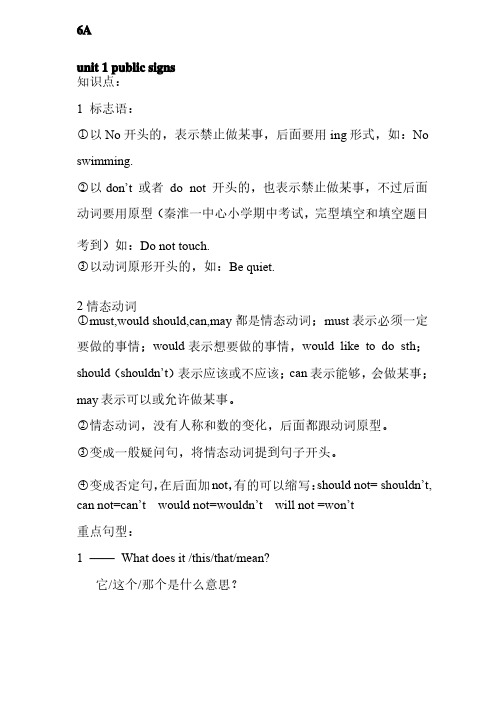
6Aunit 1 public signs知识点:知识点:1 标志语:标志语:○1以No 开头的,表示禁止做某事,后面要用ing 形式,如:No swimming.○2以don don’’t 或者或者do not 开头的,也表示禁止做某事,不过后面动词要用原型(秦淮一中心小学期中考试,完型填空和填空题目考到)如:Do not touch.○3以动词原形开头的,如:Be quiet. 2情态动词情态动词○1must,would should,can,may 都是情态动词;must 表示必须一定要做的事情;would 表示想要做的事情,would like to do sth ;should (shouldn shouldn’’t )表示应该或不应该;can 表示能够,会做某事;may 表示可以或允许做某事。
表示可以或允许做某事。
○2情态动词,没有人称和数的变化,后面都跟动词原型。
情态动词,没有人称和数的变化,后面都跟动词原型。
○3变成一般疑问句,将情态动词提到句子开头。
变成一般疑问句,将情态动词提到句子开头。
○4变成否定句,在后面加not ,有的可以缩写:should not= shouldn should not= shouldn’’t, can not=can can not=can’’t would not=wouldn would not=wouldn’’t will not =won will not =won’’t重点句型:重点句型:1 ————What does it /this/that/mean? 它/这个/那个是什么意思?那个是什么意思?It means you /wemust/should/shoudn It means you /wemust/should/shoudn’’t..意思是你/我们必须/应当/不应该。
解析:解析:当你不知道一个标志、一个词语或者一句话的意思时,可以用这句话来询问。
牛津小学四年级英语语法知识汇总
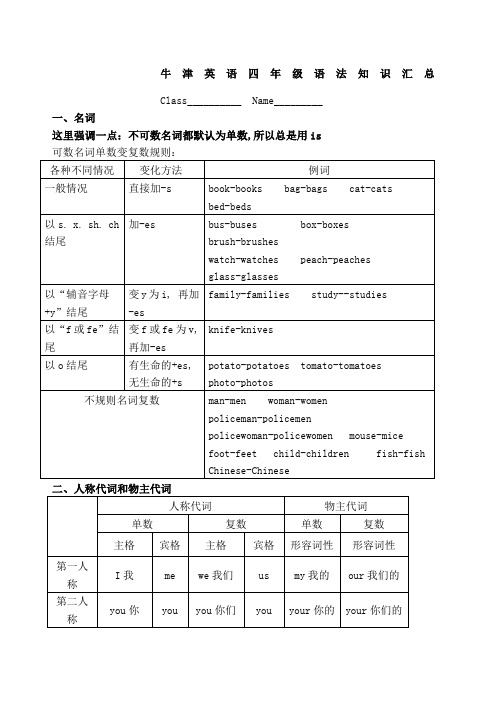
牛津英语四年级语法知识汇总Class__________ Name_________一、名词这里强调一点:不可数名词都默认为单数,所以总是用is注意:人称代词:有单复之分,有主格和宾格之分.动词前用主格.在动词和介词to,with,at等后用宾格.物主代词只有有单复之分.三、指示代词四、冠词有a、an、the.a和an的区别:an用于元音音素一般就是元音字母a、e、i、o、u前,a用于辅音音素前除元音字母a、e、i、o、u之外.五、句型:一否定句动词am、is、are+not/ 2情态动词can+ not 3 助动词do、does+ not2. 如何将一个肯定的陈述句改为否定句:1看句中有无be动词,如有,直接在be动词后+ not.2看句中有无情态动词,如有,直接在情态动词后+ not.3如上述二者都没有,就应用助动词+ not.分四个步骤:A.肯定陈述句中本来是没有助动词的,要加上去,位置在主语某人或某物后,动词前.B.确定助动词用do、does,根据句中动词,动词是原形的助动词就用do,动词是第三人称单数的助动词就用does,C.在助动词后加not.D.原句中动词假如发生变化就要恢复成原形.注意:有some的要考虑是否要用any.二一般疑问句1.如何将一个肯定的陈述句改为一般疑问句:1看句中有无be动词,如有,把be动词提到句首即可.2看句中有无情态动词,如有,把情态动词提到句首即可.3如上述二者都没有,就应把助动提到句首.分四个步骤:A.肯定陈述句中本来是没有助动词的,要加上去,位置在主语某人或某物后,动词前.B.确定助动词用do还是does,根据句中动词,动词是原形的助动词就用do,动词是第三人称单数的助动词就用doesC.把助动词后提到句首.D.原句中动词假如发生变化就要恢复成原形.注意:有some的要考虑是否要用any.三特殊疑问句表示疑问,有疑问词在开头,回答有很多种可能.四动词单三1.什么时候用单三:当主语是第三人称单数或为不可数时,动词要用第三人称单数形式.2.哪些是第三人称单数:除了I我 ,we我们, you你,you你们外,其他所有的人称代词和名词短语都是第三人称,只是第三人称里分单数和复数.如第三人称单数:my book, your book, our book, he, she, her brother, his sister, their book, Jack, Lucy, it等.注意:第三人称复数和第一人称,第二人称+动词原形.如第三人称复数:my books, your books, they, his brothers 等.五、其他需要掌握的知识一同音词: too---two----to buy---by I---eye four----forthere----their right----write sun----sonno----knowhere---hear who’s ----whose二近义词: many----a lot of / lots of large----big desk----table photo---picture lamp----lightlike----love三反义词或对应词:old----new go----come big----smallthin----thicksoft----hardthin----strongsmooth 光滑的-rough 粗糙的 open----close black----white here----there this-thatthese-those四完整形式:let ’s=let us 让我们 I’d=I wouldcan ’t=can not I’m=I am五词性变换:one 序数词- firstmonkey 复数-monkeysis 复数-arefamilies 单数-familymake 现在分词-making we are 缩略形式-we ’re do 第三人称单数-does have 第三人称单数-hasphoto 复数-photosfat 反义词-thin。
(2021年整理)牛津小学英语应掌握的重要知识点

(完整版)牛津小学英语应掌握的重要知识点编辑整理:尊敬的读者朋友们:这里是精品文档编辑中心,本文档内容是由我和我的同事精心编辑整理后发布的,发布之前我们对文中内容进行仔细校对,但是难免会有疏漏的地方,但是任然希望((完整版)牛津小学英语应掌握的重要知识点)的内容能够给您的工作和学习带来便利。
同时也真诚的希望收到您的建议和反馈,这将是我们进步的源泉,前进的动力。
本文可编辑可修改,如果觉得对您有帮助请收藏以便随时查阅,最后祝您生活愉快业绩进步,以下为(完整版)牛津小学英语应掌握的重要知识点的全部内容。
(完整版)牛津小学英语应掌握的重要知识点编辑整理:张嬗雒老师尊敬的读者朋友们:这里是精品文档编辑中心,本文档内容是由我和我的同事精心编辑整理后发布到文库,发布之前我们对文中内容进行仔细校对,但是难免会有疏漏的地方,但是我们任然希望(完整版)牛津小学英语应掌握的重要知识点这篇文档能够给您的工作和学习带来便利。
同时我们也真诚的希望收到您的建议和反馈到下面的留言区,这将是我们进步的源泉,前进的动力。
本文可编辑可修改,如果觉得对您有帮助请下载收藏以便随时查阅,最后祝您生活愉快业绩进步,以下为〈(完整版)牛津小学英语应掌握的重要知识点〉这篇文档的全部内容。
一排除July22, 2014①是情态句吗?情态助动词can should may must+动词原型You may/can/should/must go home now.Would you please….?某人would like to do…因为情态助动词would的束缚,like动词无法进行时态化。
②是祈使句吗?祈使句中动词使用原型Do型—Don’t forget me! Read the new magazine,please. Please don't laugh at him. Don't climb trees again。
Go and wash your hands. Watch/mind your head!注意上方/小心碰头Remember to turn off the light.Be型—Be a good boy! 要做一个好孩子! Be quiet,please。
牛津小学英语B重点短语句型知识点和习题

牛津小学英语5B Unit1词组和日常用语:a new term一个新学期 have a lesson上一节课the first lesson第一节课 boys and girls 孩子们the first lesson of the new term新学期的第一节课Miss Li and her students 李老师和她的学生们Welcome back to school.欢迎回到学校.Nice to see you.见到你很高兴.on Monday在星期一in the morning在早上 on Monday morning在星期一早上have an Art lesson 上一节美术课at a Chinese lesson在语文课上eight subjects八个学科 this term 这学期what subject什么学科 an interesting story 一个有趣的故事how many lessons 多少节课 in a week在一星期里let me see让我看看 tell me 告诉我at once立刻,马上 the hot coffee热咖啡near the clock在钟的附近 for the doctor给医生like Maths very much非常喜欢数学 I’ll show you . 我会演示/证明给你看plus and minus 加和减 What’s the trick有什么窍门from Sunday to Saturday从星期日到星期六How about you 你怎么样呢重点句子:1.What day is it today It’s Tuesday.今天星期几今天星期二.2.What day is it to day It’s Friday.今天星期几今天星期五.3.What lessons do you have in the morning We have Chinese, English, Maths and Science.你们早晨上什么课我们上语文、英语、数学和科学.4.What lessons do you have on Wednesday afternoon We have English, Music and PE.星期三下午你们上什么课我们上英语,音乐和体育.5.What subject do you like I like Maths. 你喜欢什么科目我喜欢数学.6.How many days are there in a week There are seven . 一个星期有几天七天.7.How many English lessons do we have in a week We have four.我们一周上多少节英语课四节.句型转换:1. It’s Tuesday. 对划线部分提问 What day is it today2. I like English and Maths. 对划线部分提问What subject do you like3. We have eight subjects this term. 对划线部分提问How many subjects do you have this term4. We have Chinese, Maths and English in the morning. 对划线部分提问 What lessons do you have in the morning5. Nice to see you. 同义句Nice to meet you./Glad to see you./Glad to meet you.词形转换 :China形容词—Chinese here同音词—hearlesson同义词—class good反义词—badinterest形容词—interesting buy同音词—by/byeminus反义词—plus she宾格—herright同音词—write he宾格—himright反义词—wrong open反义词—close一、英汉互译1.第一节课__________________2.在晚上_____________________3.在星期一早上_______________4.一周中_____________________5.一本有趣的书_______________6.上更多的体育课______________7.at once____________________8.have an English lesson_________9.I hope_____________________10.Welcome back to school._______11.两节数学课________________12.新学期第一天________________13.every day__________________14.this afternoon_______________15.let me see_________________16.What’s the trick____________17.八门科目__________________18.What subject do you like______19.thirty minus thirteen__________20.多少节课___________________21.寻找______________________ 22.课后_______________________二、按要求写出下列单词1. do第三人称单数__________2. lesson近义词__________3. these对应词__________4. hot对应词__________5. plus近义词__________6. her主格__________7. class复数形式__________ 8. parents所有格__________9.children单数形式 __________ 10. write同音词 __________三、根据单词首字母和句子意思,将对话中的单词补充完整A: Welcome b________ to school, Ben.B: Nice to m________ you, Mr Green.A: There is a n________ subject in this t_______, do you knowB: Yes. It’s S________ S________.A: Do you l________ itB: Maybe. I t________ it will be i________.A: Of course. When do you h________ this l________ On M________ B: No. It’s on F________. W________ will teach us, Mr GreenA: Mr Zhang. He is a very good t________.四、判断下列各组单词画线部分的发音是否相同,相同的打T,不相同的打F.1.first term2.term interesting3.about how4.many table5.subject Monday6.Maths what7.Sunday but 8.Friday minus五、完成句子.1.你喜欢什么学科我喜欢语文.What _______ do you likeI like __________.2.星期二你们有什么课What _______ do you have ______ Tuesday.3.这是新学期的第一节课.This is the _______ ________ of the new term.4.放学了. 让我们弄点儿吃的.School is over. Let’s go and _______ something to _________.六、句型转换.1. It’s Monday today.对划线部分提问______ ______ is it today2. I like English and Art. 改为一般疑问句_____ you _____ English and Art3. her, are, Miss Li, a, and, lesson, having, students . 连词成句 ___________________________________________4.What lessons do you have用Tom替换you___________________________________________5.321 minus 123 is 198.对划线部分提问________________________________牛津小学英语5BUnit2词组和日常用语:1.a telephone call 一个电话2.at school在学校3.call her宾格给她打电话4.after lunch午饭后5.speak to Helen 和海伦通话6.speak to him和他说话7.a bad cough 严重的咳嗽 8.a high fever高烧 9.be absent缺席10.stay in bed呆在床上11.stay at home呆在家里 12.get better soon尽快好起来 13.stillfeel ill依然觉得病的14. take some medicine吃一些药 15.feel better感觉好些 16. Classesare over.所有的课结束了.17.School is over .放学了.18.get some fruit for you给你带一些水果 19.See you soon.一会见.20. Anything else 还有别的什么吗 21.open your mouth张开你的嘴 22.close the window关窗23.have a lot of rest多休息 24.choose one to call选择一个打 25.lookat these numbers看这些号码 26..wrong number打错电话27.go to see a doctor去看医生 28.want my mother想要我的妈妈29.love that fat monkey喜爱那只胖猴要求掌握的句型:1. Why are you absent today 你今天为什么缺席相当于Why are you not heretoday2.See you soon. 一会见.3.3. I hope you get better soon. 我希望你尽快好起来.4.4. How do you feel now 你现在觉得怎么样啊5.I feel… tired, hot, thirsty, ill…我觉得…累的,热的,渴的,病的.I can get a / some … for you. 我能给你一/ 一些….5. What’s wrong with you 你怎么了相当于What’s the matter with youI’ve got a … fever, toothache, cold, cough…我得了…发烧,牙痛,感冒,咳嗽….I’m sorry to hear that. 听到这我感到很抱歉.重点句子:1.How do you feel now I feel thirsty. I can get a glass of water for you.你现在感觉如何我感觉很渴.我可以给你一杯水.2. How do you feel now I feel tired. Sit here and have a rest ..你现在感觉如何我感觉很累.坐下休息.3.What’s wrong with you I’ve got a fever. I’m sorry to hear that.你怎么了我发烧了.很抱歉听到这个.4.What’s wrong with him He has got a toothache.他怎么了他牙疼了.5.What’s wrong with her She has got a bad cold.她怎么了她得重感冒了.6.May I speak to HelenThis is Helen speaking.我可以和海伦通话吗我是海伦.打电话的常识:如你致电某人,电话接通后,你应对接电话的人说May I speak to …, please 如果你接听电话,而你正是对方想找的人,应说Yes, speaking.如果来电的人找的人不在,你应说Sorry, …is not here.无论是你致电他人或他人致电给你,若你想问是谁在接听电话,应说Who’s that, pleaseIs that…speaking如果你想告诉对方你是谁,应说This is ….speaking.如果有人打错电话,你应说Sorry, wrong number一、翻译下列词句1打电话给我______________ 2 get better ______________3午饭后 ______________ 4 a high fever ______________5重感冒 ______________ 6 go to see a doctor ______________7呆在床上 ______________ 8 anything else ______________9对海伦说 ______________ 10 take some medicine _____________11在学校 ______________ 12 have a lot of rest _____________二、判断下列每组单词画线部分发音是否相同,用“√”或“×”表示.1. got on2.monkey doctor3.these evening4.how show5.high right6.speak breakfast7.for worker 8. cold lot 9. hope sorry三、单项选择1. --May I ________ to Yang Ling--This is Yang Ling ________.A. speak;speakB. speak;speakingC. speak;to speak2. Why ________ you absent todayA. doB. areC. is3. I hope you get ________ soon.A. bestB. goodC. better4.________some medicine and ________a lot of rest.A. Eat, takeB. Take, haveC. Take, take5. What’s wrong________ youA. withB. atC. in四、找出正确的答句.1. How are you A. This is Mike speaking.2. How do you feel now B. Yes, a lot.3. What’s wrong with you C. I’ve got a bad cough.4. May I speak to Mike D. I’m fine, thank you.5. Are you taking any medicineE. I feel ill.五、连词成句1. Su Yang, her, calls, mother, lunch, after .____________________________________2. taking, you, medicine, are, any____________________________________3. to, hear, am, sorry, I, that .____________________________________4. a, get, I, glass, water, of, you, for, can .____________________________________六、用下面所给的词填空.For, in, of, at, about, to, on, with1. I’m sorry hear that.2. What’s wrong you3. I can get some apples her.4. We have an English lesson Monday morning.5. ---Is Nancy ---No, she’s home.6. This is the first day the new term.7. It’s three thirty.七、根据所给汉语完成下列句子,每空填一词.1. 苏海生病了,她得了重感冒.Su Hai is . She has a .2. 你现在感觉怎样do you now3. 我希望你不久就好起来.I you .4. 服一些药,好好休息.some and have a .八、根据上下文完成对话.A: Hello, may I to Su YangB: I’m afraid you can’t. She is . She a fever.A: I’m sorry that. Is she medicine.B: Yes, a lot. She is a now .A: I’ll see tomorrow.B: Thank you.A: It’s my .牛津小学英语5BUnit3词组和日常用语:1.take photos拍照2.go shopping去购物3.collect stamps集邮4.make model ships做模型船5.make clothes做衣服6.grow flowers种花7.draw pictures画画8.make model planes做模型飞机9.read newspapers看报纸 10.read magazines看杂志 11.make cakes做蛋糕 12.cook nice food做美味的食物 13.wash clothes 洗衣服 14.do housework做家务 15.fly a kite放风筝 16.listen to music听音乐17.water the flowers浇花 18.play football踢足球 19.play cards打牌 20.play chess下棋 21.watch TV看电视 22.play computer games 玩电脑游戏 23.have many hobbies有许多爱好 24.many beautiful stamps许多漂亮的邮票25.show them to his classmates把它们给他的同学看26.show us his stamps 给我们看他的邮票 27.Chinese stamps中国邮票28.animal stamps动物邮票 29.Here they are .它们在这儿 30.write music 写音乐31.make pretty dresses for my doll 给我的洋娃娃做漂亮的连衣裙32.the same hobby相同的爱好e a computer使用电脑e chopsticks使用筷子要求掌握的句型:1、关于业余爱好,我们可以问:Do you have any hobbies你有些爱好吗Yes, I do. I like … taking photos 是的,我有.我喜欢...拍照No, I don’t. 不,我不喜欢.可以拓展为:Does Ben have any hobbies Yes , he does . He likes collecting Chinese stamps .本有爱好吗是的.他喜欢收集中国邮票.Does your uncle have the same hobby Yes, he does.你叔叔有同样的爱好吗是的.Does she like going shopping No, she doesn’t她喜欢购物吗不,她不喜欢.2、也可以问:What’s your hobbyI like growing flowers . Me , too .你的爱好是什么我喜欢种花.我也是.What’s your grandmother’s hobby She likes making clothes .你祖母的爱好是什么他喜欢做衣服.3、叙述某人的爱好,我们可以说:He / She likes … going shopping .他 / 她喜欢...去购物.He / She doesn’t like… growing flowers .他 / 她不喜欢...种花重点句子:1.Do you have any hobbies Yes, I do . I like taking photos. 你有爱好吗是的,我有.我喜欢拍照.2.Does Ben have any hobbies Yes , he does . He likes collecting Chinese stamps .本有爱好吗是的.他喜欢收集中国邮票.3.What’s your hobbyI like growing flowers . Me , too .你的爱好是什么我喜欢种花.我也是. 4.What’s your grandmother’s hobby She likes making clothes .你祖母的爱好是什么他喜欢做衣服.5.Does your uncle have the same hobby Yes, he does..你叔叔有同样的爱好吗是的.6.Does she like going shopping No, she doesn’t她喜欢购物吗不,她不喜欢.7.Do you water the flowers every day Sometimes I do . Sometimes I don’t .你每天浇花吗有时我浇.有时不浇.8.My brother doesn’t like watching TV.我哥哥不喜欢看电视.句型转换:He likes going shopping. 改为一般疑问句,并作否定回答Does he like going shoppingNo, he doesn’tBen likes collecting stamps. 改为否定句Ben doesn’t like collecting stamps.Helen and I like making pretty dresses. 对划线部分提问What do Helen and you likeMy father’s hobby is keeping goldfish. 改为一般疑问句Is your father’s hobby keeping goldfish知识点:一般现在时主要由动词原形表示,但第三人称单数后的动词词尾有所变化.第三人称单数动词词尾的变化有几种形式:1、一般情况加-s reads, says, takes2、以ch, sh, s, x, 或o结尾的词加-es teaches, washes, goes, watches以辅音字母加y结尾的词变y为i再加-es studies, cries, carries一.按要求写单词.1.beautiful同义词 __________2.family复数 _______________3.take现在分词 _____________4.grow第三人称单数________5aunt同音词 ______________ 6e反义词 _____________7.he物主代词 ______________ 8.dress复数 ____________9.Mike名词所有格 __________10.these单数 ________________二.词组互译1.拍照_________________ 2.每天______________3.收集邮票____________4.做衣服____________________5.在花园里_______________6.cook nice food________________7. animal stamps__________ 8.grow beautiful flowers_________9. the same hobby__________ 10.his classmates_______________三.、单项选择1. Show ______ his stamps, please. A. me B. my C. I2. My sister ______ collecting stamps. A. like B. likesC. liking3. His hobby is ______ football. A. playing B. playC. plays4.Do you have ______ Yes, I do.A. some hobbies B. any hobbiesC. any hobbys5. ______ your uncle have the same hobby Yes, he ______.A. Do, doesB. Does, doesC. Is, is四、用所给词的适当形式填空.1.My aunt _____like_____grow beautiful flowers.2. Can you _____takea photo for____I Sure.3. Do you ____watch TV every day4. They are all______listento music in the sitting-room.5. Liu Tao _____have many beautiful_____stamp.6. He________draw a picture in his classroom now.7. My father_____ read newspapers after supper every day.五、找出正确的答句.1. What are you doing there A. Yes, I do.2. Do you have any hobbiesB. I’m watering the flowers.3. What’s your hobbyC. She can make clothes.4. What can your sister do D. I like collecting stamps.六、句型转换.1. David likes playing basketball. 改为否定句David ______ _______ playing basketball.2.Show us his stamps.改为同义句Show_____ _____ to ______.3.Do you water the flowers every day用now替换every day_____________ __4. Does your uncle have any models 改为陈述句_____________ __七、连词成句.1. you, skirt, for, my, can, a, make, pretty, sister_______________________________________2. them, he, classmates, showing, is, to, his .__________________________________________八、完成句子.1.-----你妈妈在哪 ------她在花园浇花.------_______ is your mother------She’s ________ the flowers in the garden.2.她的爸爸是医生.他的爱好是看报.Her father is a doctor. ______ hobby is ______ newspapers.3.------李老师有什么爱好吗 ------有.她喜欢弹钢琴.------_______ Miss Li _______ any hobbies------Yes. She _______ ________ the piano.4.你能为我的洋娃娃做顶帽子吗____you make a hat _____my doll6.看那个女孩在仔细地画一只老虎.Look That girl______, ____ ______ _____ a tiger carefully.牛津小学英语5BUnit4词组和日常用语:动副词组类似语法speak loudly 大声地讲话 laugh loudly / cry loudly / sing loudly /run fast 跑得快 read fast /jump high 跳得高 fly high / climb high /sit quietly 安静地坐着 sleep quietly / read the book quietly dance beautifully跳舞跳的优美 sing beautifully /walk carefully 小心地走 write carefully/listen carefully swim well 游泳游得好 study well / play wellan English friend一位英国朋友 write an e-mail写一封电子邮件 his English friend他的英国朋友in the computer room在电脑房里 want to play table tennis 想要打乒乓 under the tree在树下play table tennis with Wang Bing 和王冰打乒乓 write to me 写信给我a letter for me 一封给我的信 write an e-mail to my English friend写一封电子邮件给我的朋友 study Chinese学习语文surf the internet浏览网页 live in London 住在伦敦 from Monday to Friday从星期一到星期五live in a small town near London住在伦敦附近的一个小镇里 in the sea 在大海里 on the beach 在海滩上 every day 每一天 every week 每一周do exercise 做锻炼 from my Uncle Lee来自我的李叔叔要求掌握的句型:I’m busy.我忙的.We’re the same age. 我们是同龄人.A: Does he / she jump high 他 / 她跳得高吗B: Yes, he / she does.是的,他 / 她是.No, he / she doesn’t. 不,他 / 她不是.A: What does he / she usually do on Sundays 他通常在星期日做什么B: He / She usually takes photos.他通常拍照.A: What subjects does he study at school 在学校他学什么课程B: He studies English, Maths, Science and Art. 他学英语、数学、科学和艺术.重点句子:1.Does Mike jump high Yes, he does. 麦克跳得高吗是的,他跳得高.2.Does Nancy run fast No, she doesn’t. 南希跑得快吗不,她跑得不快.3.What does Mike usually do on Sundays He usually takes photos. 他通常星期日做什么他通常拍照.4.What does LiuTao usually do in the evening He usually waters flowers.刘涛通常晚上做什么他通常浇花.5. What does Su Yang usually do after school She usually reads science magazines .苏洋通常放学后干什么她通常读科学杂志.6. What subjects does he study at school He studies English ,Maths , Science and Art .他在校学习什么科目他学英语,数学,科学和美术.7.What does she usually do on SaturdayShe usually goes shopping and does housework . She’s very busy .星期六她通常干什么她通常购物,做家务.她很忙.8.My mother washes clothes in the evening.我妈妈在晚上洗衣服.9.How does your father go to work He usually goes to work by bus .你父亲通常怎么去上班他一般乘公交车去.句型转换:1. Helen usually goes shopping on Saturdays. 对划线部分提问What does Helen usually do on Saturdays2. Does he jump high改为陈述句He jumps high.3. He runs fast. 改为否定句He doesn’t run fast.知识点:1. 在一般现在时中,行为动词与he, she, it等第三人称单数的搭配时须在行为动词后加s或es,我们来看例句:-He likes English very much. 他非常喜欢英语.2. 将句子变为一般疑问句时要借助于助动词does来帮忙,此时行为动词要用动词原形,如:-Does he like English very much 他很喜欢英语吗-Yes, he does. 是的,他很喜欢.3. 第三人称单数的特殊疑问句是在一般疑问句的基础上,再于句首加上特殊疑问词, 如:-What subject does her brother like 他哥哥喜欢什么科目-He likes Chinese. 他喜欢语文.一、英汉互译1写一封电子邮件______________ 2 surf the Internet _____________3住在一个小镇 ______________ 4 a letter for me _____________5学习语文 ______________ 6 speak loudly _____________7跑得快 ______________ 8 sit quietly ______________9跳得高 ______________ 10 dance beautifully______________二、找出正确的答句.1. What can she do A. Sorry, I can't.I'm busy.2. Let's go and play football. B. No, I'm not.3. Does David write carefullyC. She usually reads books.4. Are you surfing the Internet D. Yes, he does.5. What does she usually do E. She can play the piano.三、连词成句.1. at, studies, Lucy, school, English .____________________________________________________2. does, the, do, what, your, evening, in, mother____________________________________________________3. live, Helen, does, where____________________________________________________4. dance, beautifully, Kate , does____________________________________________________四、单项选择.1. What does his sister usually do __________ SundayA. onB. inC. at2. Gao Shan __________ to play table tennis with me.A.wantB. wantsC. going3. --Are you __________ the Internet--No, I'm not.A. surfB. surfsC. surfing4. I go to school __________ Monday __________ Friday.A. on...andB. from...toC. at...at5. -- What does Ben usually do after school-- He usually __________ after school.A. plays footballB. read magazinesC. playing table tennis五、按要求改写句子1.I speak loudly.改为否定句:改为一般疑问句:用Mike改写: _____________________________________________2. Nancy dances beautifully.改为否定句:改为一般疑问句: ___________________________________________用The girls改写: __________________ ______________3. I usually do my homework after school.提问:4. My father usually goes to work from Monday to Friday.提问:1. He ________ to school from ________ to ________.2. He usually ________ ________ in the evenings from Monday to Friday.3. He ________ the violin on ________ mornings and ________ ________ onSaturday afternoons.4. What does he do on Sunday morningsHe ________ ________ ________ stories.5. When什么时候 does he usually go to the supermarketHe ________ ________ ________ the supermarket on ________ ________. 6. When does he usually watch TV and ________ ________ musicHe ________ ________ TV on ________ ________ and ________ ________ music on ________ ________.七、根据单词首字母和句子意思,将短文中的单词补充完整.5分Jack is my good f________. He is f America. He likes p________ basketball and t________ photos. We have the s________ h________. He c________ to China to s________ Chinese. His father w________ in Beijing. They l in a big h .They both like China.牛津小学英语5BUnit6词组和日常用语:at a PE lesson在一节体育课上 give orders 发命令try to…试着做某事follow the orders跟随命令 stand in a line站成一排 do some exercise做些锻炼 put your feet together双脚并拢put your knees together双膝并拢 jump up and down上下跳 listencarefully仔细地听turn left 向左转 turn right向右转 turn left and right 左右转put …on…把…放在…上touch… with…用…触摸… do this ten times这样做十次lie on one’sback仰躺 lie on his back他仰躺 lift up your left leg提起你的左腿lift up your arms抬起你的双臂stand up起立 feel tired感觉累的 touch the flowers with her mouth用她的嘴触摸花move your legs to the left把你的腿移向左边 move them to the right 把它们移向右边move the table here把桌子移到这儿 put the plate on his finger把盘子放在他的手指上stand on the man’s shoulders站在那个男人的肩上复sit on the woman’s knee坐在那个女人的膝盖上单 want to be healthy想要健康 do some exercise with me和我做些锻炼要求掌握的句型:1.站成一排. Stand in a line.2.让我们做一些运动. Let’s do some exercise.3.现在请仔细地听. Now, listen carefully.4.上下跳. Jump up and down.5.做这个……次. Do this … times. Do this ten times.6.把……放在……上面. Put… on… Put the pineapple on your head.7.用……触摸……多少次 touch…with……times Touch your left leg with your right hand three times.重点句子:1.Put your hands on your head. All right.把你的双手放在你的头上.好的.2.Put this rubber on your nose. OK.把这橡皮放在你的鼻子上.好的.3.Can you put this big grape on your mouthYes , I can .你能把这个大葡萄放在你的嘴上吗是的,我会.4.Touch your left leg with your right hand.OK.用你的右手摸你的左腿.好的.5.Touch your right shoulder with your left hand.用你的左手摸你的右肩.6.Touch your toes with your fingers three times .用你的手指触摸你的脚趾三次.7.Turn left and right seven times . 左右转体七次.8.Lie on your back and lift up your legs eight times .仰躺,抬起你的双腿八次.9.The boy has two small eyes and a big mouth .这个男孩有双大眼睛和一张大嘴10.It has two heads , two necks , four arms , eight fingers and six legs .它有两个头,两个脖子,四条手臂,八个手指和六条腿.一、按要求写单词.1. foot 复数 _____________2. careful 副词 _____________3. left 反义词 ______________4. up 反义词 _______________5. child 复数 _______________6. right 同音词 _____________7. do 第三人称单数 _________ 8. let’s 完全形式 ____________9. give 现在分词 ___________二、英汉互译.1两次 ______________ 2 give orders ______________ 3向左转 ______________ 4 stand in a line ______________ 5你的右腿 ______________ 6 touch with ______________ 7上一节体育课 ______________ 8 lie on one's back______________ 9上下跳 ______________ 10 lift up ______________ 11do some exercise _____________ 12 put...on....______________三、判断下列单词的发音是否相同,用T F表示.1.waiter waitress2.day play3.time lift4.knee week5.take stamp6.photo model7.Sunday but 8.Friday minus四、选择合适的答句.1. Are you tired A. Yes, she does.2. Does she like taking photos B. She likes taking photos.3. Put your book on your head. C. All right.4. What does she like doing D. This is Miss Li speaking.5. May I speak to Miss Li E.Yes, we are.五、选择填空.1. We like ____________ same colour.A. aB. anC. theD. /2. Kate ______ blue eyes. Her hair _______ brown.A. have isB. have areC. has isD. has are3. Many boys in our class like _________ very much.A. play basketballB. playing basketballC. play the basketballD. playing the basketball4. What ______ Helen’s family usually doA. does B is C. are D. do5. Put your hands _______ your head and turn ______ left and right.A. on /B. up /C. on toD. / to6. Touch your eyes with your fingers _____________A. ten timesB. ten timeC. for ten timesD. at ten times六、按要求改写句子.1. Put your feet together. 改为否定句__________ put your _________ together.2. The boy is standing on the man’s shoulders. 改为一般疑问句_________ the boy ________ on the man’s _________3. They have five lessons every day. 对画线部分提问_________ __________ lessons _______ they have every day4. Can you put this pineapple on your head 否定回答_______, I _________.5. touch three toes with times your fingers your 连词成句______________________________________________________七、根据中文提示,完成下列句子.1.躺下来并举起你的双臂._______ on your _______ and _______ ________ your arms.2.闭上你的眼睛,用手去摸你的文具盒.Close your _________. __________ your pencil box ________ your hand.3. 站成一排,双脚并拢.__________ in a _______. Put your ___________ together.牛津小学英语5BUnit7Unit 7 知识要点词组和日常用语:1.没有时间休息 have no time for rest2.没有时间吃早饭have no time for breakfast3.起床 get up4. 准备be ready for5.准备吃早饭 be readyfor breakfast 6.准备吃午餐 be ready for lunch 7.去学校 go to school 8.洗脸 wash one’s face 9.刷牙 brush one’s teeth 10.值日 on duty11.观看足球比赛 watch a football game 12.看电视 watch TV 13.真的很热 be really hot 14. 确实忙be really busy 15.开始上课classes begin 16.快点 be quick 17.随身带些面包 take some bread withme 18.让我们快点 Let’s hurry 19.还没有 not yet 20.在夜间 atnight 21.该是做某事的时候了 it’s time for sth/ it’s time to do sth 22.几点what time is it/2.what’s the time3.23.在四点一刻 at a quarter past four 24.六点五十 ten to seven 25.十二点四十五 a quarter to one 26.十一点一刻 a quarter past eleven27.三点半 half past three 28.在六点半at half past six 29.十二点差一刻 a quarter to twelve 30.太迟了it’s late 31.忙碌的一天 a busyday 32.吃早饭have breakfast 33.吃午饭have lunch 34.吃晚饭havesupper 35.吃正餐have dinner 36.回家come home go home 37.去睡觉go to bed 38.需要打扫图书馆need to clean the library 39做家庭作业do one’s homework 40.想要看电视 want to watch TV 41. 骑自行车ride a bike 42.骑马 ride a horse 43.放风筝fly a kite44.洗衣服wash clothes 45.步行 on foot 46.在星星公园at StarPark 47.打排球play volleyball 48.打乒乓play table tennis 49.去参加聚会go to the party 50.加入我的行列join me 51.看钟look at theclock 52.从早上七点到晚上十点from seven in the morning to ten at night要求掌握的句型:1、询问几点了可以用What’s the time = What time is it It’s…2、. ….的时间到了./ 该…了.It’s time to…动词词组如:It’s time to have breakfast.It’s time for…名词如:It’s time for breakfast.3、想和我一起吗 Do you want to join me宾格4、5、他没时间吃早饭.He has no time for breakfast. 同义句He doesn’t have any time for breakfast. no=not any6、她在十点睡觉.She goes to bed at ten o’clock.注意:在具体的几点钟前面,我们用“at”如:at ten o’clock.在哪一天如在星期几前面我们则用“on”on Monday在一段时间里我们则用“in” in the morning /in a week重点句子:1.What time is it It’s a quarter past seven . It’s time for school . 几点了十点五十分.该吃饭了.2.What’s the timeIt’s ten to eleven . It’s time for lunch. 几点了十点五十分.该吃饭了. 3.I want to make a cake. Do you want to join meNo, I’m coo king rice.我想做蛋糕.你想加入我吗不,我正在做饭.4.I want to play cards. Do you want to join meNo, I’m doing my homework我想打牌.你想加入我吗不,我正在做家庭作业..5.Do you want to go shopping with me No , I don’t . I’m watering the flowers.你想和我去购物吗不.我正在给花浇水.6.What time do you go to school I go to school at ten to seven .你什么时候去上学我在六点五十去学校.7. What time does your brother watch TV He watches TV at half past seven .你兄弟什么时候看电视他在七点半看电视.8.Classes begin at half past eight .八点半开始上.一、按要求写单词.1. tooth 复数____________2. doesn’t完全形式_________3. me 主格 ____________4. wash第三人称单数_______5. go 反义词_____________6. sit现在分词___________7. good 副词 ____________ 8. quickly形容词__________9. hear 同音词___________二、英汉互译.1.值日 _________________2.刷牙 _________________3.在夜里 _______________4.看电视 _______________5.吃午饭 _______________6.a busy day __________________7.be quick __________________8.a football game _______________9.do homework _______________10.not yet ________________三、用所给介词的适当形式填空.with for past to in at from … to … on1.She comes home at five _________ the evening.2.I’m taking some bread _________ me to school3.Now it’s time _________ supper.4.— Is it time __________ play the piano now — Yes, it is.5.I go to school __________ Monday ________ Friday.6.Now it’s half __________ eleven. We are listening to music at home.7.We usually go climbing __________ Sunday and do our homework __________ the weekends.四、单词辩音A B C D1.clock doctor box go2.park car start quarter3.teacher her order finger4.ready breakfast really head5puter subject bus lunch五、选择题.1.What your parents wantA. doB. doesC. are2. Miss Li is______. She has no time ______rest.A. tired... forB. happy...ofC. busy... to3. There's no time _______breakfast.A. forB. toC. in4. It's eight o'clock. Helen is ______her homework.A. doB. doingC. Does5. Sam _____to bed at nine every evening.A. goB. goingC. goes6. There's a football game______ a quarter to four.A.atB. pastC. About7.Are you ready lunch, David____ yet, Mum.A. to, NoB. for, isn'tC. for, Not六、按要求完成下列句子,每空一词1. There is some water in the glass. 改为一般疑问句___________ there ___________ water in the glass2. I feel ill now. 对划线部分提问___________ ___________ you feel now3. He usually grows flowers on Sundays. 对划线部分提问___________ ___________ he usually do on Sundays4. I like playing chess.改为否定句I ___________ like ___________ chess.5. It’s time to have dinner.改为同义句It’s ___________ ___________ dinner.牛津小学英语5BUnit8Unit 8 知识要点词组和日常用语:at the weekends 在周末 Friday afternoon星期五下午 talk about谈论某事 talk about their weekends谈论他们的周末 talk about our hobbies谈论我们的爱好spend one’s weekends过周末 spend your weekends 度过你的周末 surf the Internet上网 very interesting非常有趣 learn a lot from it 从中学到很多 learn a lot from the books 从书上学到很多 learn from him 向他学习 every Saturday and Sunday 每星期六和星期日 like sport喜欢运动 how about…怎么样 of course当然 play on the swings荡秋千 go to the cinema去电影院 go to the park去公园 go climbing 去爬山 go swimming去游泳 go fishing 去钓鱼 go skating去溜冰 go skiing 去滑雪 watch TV at home在家看电视 watch cartoons看动画片listen to music听音乐 do housework做家务 wash the clothes 洗衣服read English 读英语 draw pictures画画 clean the rooms打扫房间sing beautifully唱歌动听 fly high飞得高 our good friends 我们的好朋友 primary school小学 study at Yu Cai Primary School在育才小学学习 like insects very much非常喜欢昆虫 a lot of insects许多昆虫other interesting insects其它有趣的昆虫 watch ants观察蚂蚁 carry big things搬运大东西 dance in the flowers在花丛中跳舞 catch butterflies捉蝴蝶 catch fireflies 捕捉萤火虫 put them in the bottles把它们放在瓶子里 glow at night在夜晚发光 sleep in the tree 在树上睡觉 Class is over下课了 School is over放学了课后 after class 放学后 after school要求掌握的句型:。
牛津版英语小学知识点梳理
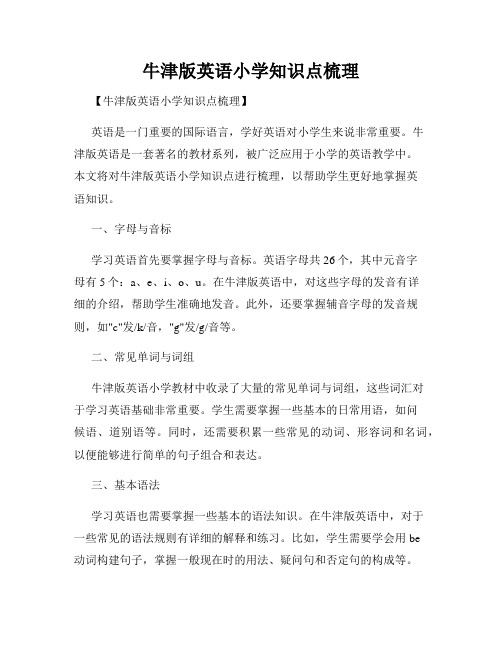
牛津版英语小学知识点梳理【牛津版英语小学知识点梳理】英语是一门重要的国际语言,学好英语对小学生来说非常重要。
牛津版英语是一套著名的教材系列,被广泛应用于小学的英语教学中。
本文将对牛津版英语小学知识点进行梳理,以帮助学生更好地掌握英语知识。
一、字母与音标学习英语首先要掌握字母与音标。
英语字母共26个,其中元音字母有5个:a、e、i、o、u。
在牛津版英语中,对这些字母的发音有详细的介绍,帮助学生准确地发音。
此外,还要掌握辅音字母的发音规则,如"c"发/k/音,"g"发/g/音等。
二、常见单词与词组牛津版英语小学教材中收录了大量的常见单词与词组,这些词汇对于学习英语基础非常重要。
学生需要掌握一些基本的日常用语,如问候语、道别语等。
同时,还需要积累一些常见的动词、形容词和名词,以便能够进行简单的句子组合和表达。
三、基本语法学习英语也需要掌握一些基本的语法知识。
在牛津版英语中,对于一些常见的语法规则有详细的解释和练习。
比如,学生需要学会用be动词构建句子,掌握一般现在时的用法、疑问句和否定句的构成等。
四、日常对话与情境交际牛津版英语小学教材中设置了许多日常对话和情境交际的练习,帮助学生提高口语表达能力。
这些对话和情境交际涉及到日常生活中的各个方面,如购物、问路、问时间等,学生需要通过练习,将这些对话进行模仿和实际运用。
五、阅读与写作阅读与写作是英语学习的重要环节。
牛津版英语小学教材中包含了一些简单的阅读文章,帮助学生培养阅读理解能力。
同时,教材中也有一些写作练习,让学生进行简单的句子和段落的书写,提高写作水平。
六、语法习题与听力训练为了加强对所学知识的巩固和掌握,牛津版英语小学教材中设置了大量的语法习题和听力训练。
学生可以通过这些练习来检验自己的学习效果,同时提高对英语语音的理解和听力能力。
小结:通过对牛津版英语小学知识点的梳理,我们可以更好地了解这套教材中的英语学习内容。
小学牛津英语语法大全精心整理版

小学牛津英语语法大全第1讲字母......................... ................................................. (01)第2讲语音......................... ................................................. . (06)第3讲名词......................... ................................................. . (07)第4讲冠词......................... ................................................. (09)第5讲代词......................... ................................................. (10)第6讲形容词......................................................................... . (12)第7讲副词......................... ................................................. (13)第8讲介词......................... ................................................. (13)第9讲数词......................... ................................................. (15)第10讲连词......................... ................................................. (16)第11讲动词......................... ................................................. (17)第12讲一般现在时................................................................ (18)第13讲现在进行时................................................................ .. (19)第14讲一般过去时................................................................ .. (19)第15讲一般将来时................................................................ .. (20)第16讲句法......................................................................... . (21)第17讲听力......................... ................................................. . (23)第18讲话题......................... ................................................. . (24)第19讲构词法...................................................................... .. (26)第20讲英美文化识............................................................. . (27)第1讲字母1. 英语中共有26个字母。
牛津版英语六年级知识点

牛津版英语六年级知识点英语是一门重要的国际交流语言,对于学生来说,掌握好英语知识点是非常重要的。
牛津版英语教材是一套广泛使用的教材,下面将介绍牛津版英语六年级的知识点。
1. 词汇六年级的英语词汇相对较难,需要学生掌握更多的单词和短语。
其中包括日常生活中的常用词汇,如食物、动物、家庭成员等,还有一些关于学科的专业词汇,如数字、颜色、天气等。
2. 语法在语法方面,六年级的学生需要掌握一些基本的语法规则,例如:- 现在进行时:表示目前正在进行的动作,结构为be动词+动词的ing形式,如“I am playing football.”- 过去时:表示过去发生的动作或情况,结构为助动词(did)+动词的原形,如“He played basketball yesterday.”- 比较级和最高级:用于比较两个或更多事物的程度、大小、数量等,如“She is taller than her sister.”3. 句型六年级的学生需要学会运用一些基本的句型,以便能够进行简单的交流和表达。
常用的句型包括:- What/How + be + 主语+ doing?(用于询问某人正在做什么)- Can + 主语 + 动词原形?(用于询问某人是否能够做某事)- 主语 + be going to + 动词原形(用于表示打算做某事)4. 听力六年级的英语教学中,听力训练十分重要。
学生需要通过听力练习来提高自己的听力能力。
在听力训练中,可以用来提高学生听力的方法和技巧有:- 听力填空:通过听力材料,填写相关的信息或单词。
- 听力选择:根据听到的内容,选择正确的答案或图片。
- 听力排序:根据听到的顺序,将相关信息或图片按正确的顺序排列。
5. 阅读理解阅读理解是英语学习中的一项重要技能。
学生需要通过阅读短文,理解其中的信息,并回答相关问题。
在阅读理解训练中,可以采用以下方法:- 多读多练:通过阅读各种不同类型的短文,培养学生的阅读习惯和阅读速度。
牛津小学英语6A各单元 知识梳理
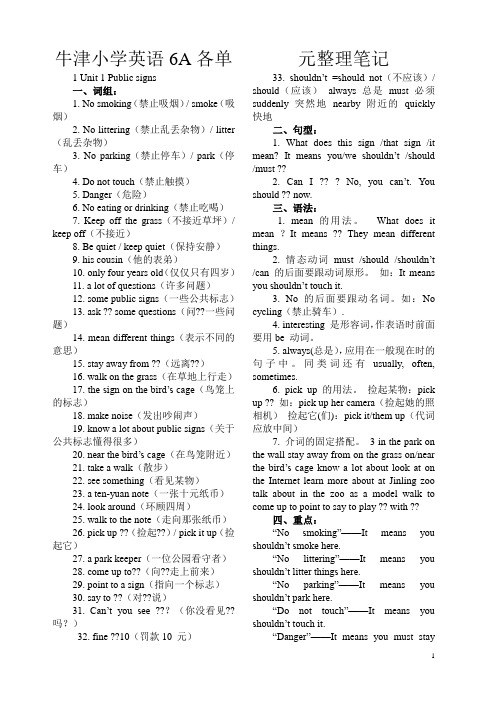
牛津小学英语6A各单元整理笔记1 Unit 1 Public signs一、词组:1. No smoking(禁止吸烟)/ smoke(吸烟)2. No littering(禁止乱丢杂物)/ litter (乱丢杂物)3. No parking(禁止停车)/ park(停车)4. Do not touch(禁止触摸)5. Danger(危险)6. No eating or drinking(禁止吃喝)7. Keep off the grass(不接近草坪)/ keep off(不接近)8. Be quiet / keep quiet(保持安静)9. his cousin(他的表弟)10. only four years old(仅仅只有四岁)11. a lot of questions(许多问题)12. some public signs(一些公共标志)13. ask ?? some questions(问??一些问题)14. mean different things(表示不同的意思)15. stay away from ??(远离??)16. walk on the grass(在草地上行走)17. the sign on the bird’s cage(鸟笼上的标志)18. make noise(发出吵闹声)19. know a lot about public signs(关于公共标志懂得很多)20. near the bird’s cage(在鸟笼附近)21. take a walk(散步)22. see something(看见某物)23. a ten-yuan note(一张十元纸币)24. look around(环顾四周)25. walk to the note(走向那张纸币)26. pick up ??(捡起??)/ pick it up(捡起它)27. a park keeper(一位公园看守者)28. come up to??(向??走上前来)29. point to a sign(指向一个标志)30. say to ??(对??说)31. Can’t you see ???(你没看见??吗?)32. fine ??10(罚款10 元)33. shouldn’t =should not(不应该)/ should(应该)always 总是must 必须suddenly 突然地nearby 附近的quickly 快地二、句型:1. What does this sign /that sign /it mean? It means you/we shouldn’t /should /must ??2. Can I ?? ? No, you can’t. You should ?? now.三、语法:1. mean 的用法。
牛津英语----小学重点知识总结

小学重点知识总结一、单词(一)词形转换 :China(形容词)—Chinese here(同音词)—hearlesson(同义词)—class good(反义词)—badinterest(形容词)—interesting buy(同音词)—by/byeminus(反义词)—plus she(宾格)—herright(同音词)—write he(宾格)—himright(反义词)—wrong/left open(反义词)—closegood(副词) —well(二)同音词二、重要句型1. -What day is it today?-It’s…该句用来询问今天是星期几,回答为It’seg:What day is it today?It’s Wednesday.2.-What lessons do you have in the morning? 上午你们有什么课?-We have…and …该句用来询问别人在上午有什么课程。
注意lesson要用复数形式lessons eg:-What lessons do you have in the afternoon?-We have Chinese, Maths , English ,and Science .3. -What subject do you like? 你喜欢什么科目?-I like Social Science.该句用来询问对方喜欢哪一门学科。
4. How many lessons do they have a week? 他们一周内有多少节课?该句用来询问一周有多少节课。
询问数量时,用how many对可数名词进行提问,用how much 对不可数名词进行提问。
例题讲解(1)It’s Tuesday. 今天星期二。
( 对划线部分提问)What day is it today ? 今天星期几?(2)I like English and Maths. ( 对划线部分提问)What subject do you like? 你喜欢什么科目?(3) We have eight subjects this term. ( 对划线部分提问)How many subjects do you have this term? 对数量提问用how many(4) We have Chinese, Maths and English in the morning. ( 对划线部分提问)What lessons do you have in the morning? 你们早上有什么课?5. How do you feel now? 你现在觉得怎么样啊?I feel…( tired, hot, thirsty, ill…) 我觉得…(累的,热的,渴的,病的)。
- 1、下载文档前请自行甄别文档内容的完整性,平台不提供额外的编辑、内容补充、找答案等附加服务。
- 2、"仅部分预览"的文档,不可在线预览部分如存在完整性等问题,可反馈申请退款(可完整预览的文档不适用该条件!)。
- 3、如文档侵犯您的权益,请联系客服反馈,我们会尽快为您处理(人工客服工作时间:9:00-18:30)。
牛津小学英语重点知识Unit 3 It was there一、词汇mobile phone 一个手机(telephone 一个电话)diary 日记本(复:diaries)CD Walkman 光盘随身听(复:CD Walkmans) earphones 耳机(复数用法)a pair of glasses 一副眼镜(two pairs of glasses)a roll of film 一卷胶卷(two rolls of film)Sports Day 体育运动日running race 赛跑(跑步比赛)take some photos 拍些照片look for her camera 寻找她的照相机pick them up 把它们捡起来(代词it, them放中间)remeber 记(反义:forget忘)close your eyes 闭上你的眼睛a moment ago 片刻前(刚才)——just now 刚才teach her 教她the names of some of the things 其中一些物品的名字learn the words 教那些单词put their things 放置他们的东西ask and answer the questions 问和回答那些问题listen to some music 听些音乐circle the correct words 圈出正确的单词二、语言点excited——exciting 分辨excite是动词,意为\"(使)兴奋;激发;唤起\",其形容词为excited和exciting。
excited表示\"兴奋的\",指人、物对......感到兴奋,exciting表示\"令人兴奋的;使人激动的\",指人、事、物本身让人兴奋、激动。
试比较Are you excited about going to Beijing? 你要去北京了,感到兴奋吗?He told us an exciting story yesterday. 他昨天给我们讲了一个使人激动的故事。
It's nothing to get excited about. 这没什么可值得激动的。
I've got an exciting piece of work. 我得到了一份令人兴奋的工作。
练习:We'll have a new lesson—computer studies. All of us are_______about it.Please share(分享)your ______ moment with us.三语法点过去式(1) Be动词型概念:表示过去某时间发生的事,存在的状态或过去反复(习惯)发生的动作be型句子(也就是am, is ,are在句子里做动词的句子)am, is →was are →were体会: He was a student 2 years ago, now he is a worker.There were 3 oranges in my bag a moment ago, but now there is only one.I often got up at six 2 years ago. 我两年前通常在六点起床。
(过去习惯性做的动作)( I often get up at six in the morning. 现在习惯性做的动作)(体会: 通过Be动词的变化来体现过去式的意思)句子转换: My camera was on the desk just now. →My camera was not on the desk just now.(我的照相机刚才在课桌上。
)(我的照相机刚才不在课桌上)Was your camera on the desk just now?→Where was your camera just now?(你的照相机刚才在课桌上吗?)(你的照相机刚才在哪儿)以前学过的部分Be句子:注意Be 动词的变化What are their jobs? They are teachers now. ——What were their jobs? They were teachers 2 years ago. Where is your mother? My mother is in the shop. ——Where was your mother? My mother was in the shop just now.What's the matter with him? He is very hot. ——What was the matter with him? He was very hot just now.How old are you? I'm 6 years old. ——How old were you at that year? I was 13 years old.What's in the room? There are 3 people in it.——What was in the room? There were 3 people just now.本课句子:Where's your diary? Where are your glasses?It's on the desk. They are on the sofa.No, it isn't there now. No, they are not there now.But it was there a moment ago. But they were there just now.( on in under beside near behind between around )阅读体会:(1)A: I can't find my CD Walkman. Do you know?B: It's on your desk.A: Let me see. Oh, no, it isn't there.B: But it was there a moment ago. Where is it now?Let me see. Is it in the bookcase? Go and have a look.A: OK. Let me have a look.——My dear, it's so funny.It's here right. But it was not here just now. Who put it here?(2) A: Excuse me. I want to visit Miss Gong. Is she in this office?B: Yes, She was in the office just now. But now she is not here.A: Is she tall?B: Yes, and today she is in a red coat.C: No, she was in a red coat yesterday, but today she is not.B: Ah, yes.A: Thanks, bye.(3) A: There were 3 mobile phones on the sofa.B: Yes, and there are 4 mobile phones beside the tape recorder. But there are not so many now. A: They were all in this room. But where are those 5 ones?B: Don’t worry. The policemen are coming soon.(4) A: There were a lot of trees around our school 2 years. But now there are only about 10 trees.B: And there was a beautiful park beside our home, but now it isn't there now.A: Shall we grow some trees again?针对性练习:(1) A: _____ your brother in the kitchen?B: No, he _____. I can't see him.A: But he _____ in it just now, beacause he _____ having supperB: ______ he in the garden?A: Perhaps, his toy is there. Let's find him.B: Oh, no. He _____ in the tree.(2) A: Where______ you just now?B: We_____ behind the school. We were playing games.A: I see. But where _____ Mike? Now he _______ with you.B: I think he _______still there with another(另外的)boys.四、综合练习改错:1. Where are you a moment ago?2. My parents were in the sitting-room, I am in my study.3. Is there a cat here just now?4. My English book wasn't there just now, but it was here. How funny.5. There was an excited football match here in the afternoon.中译英1. 你的手机在哪?我想在沙发上。
2. 你刚才在哪?我在电脑房。
3. Mike刚才不在这里。
4. 我的照相机刚才还在这里的,现在不在这了。
5. 刚才在冰箱上有几把钥匙。
6. 万圣节就要到了,我的学生变的很兴奋。
